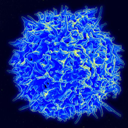Urine Biomarker Helps Identify and Monitor Proliferative Lupus Nephritis
In lupus patients, urinary CD4 T cell counts correlate selectively and specifically with disease activity and renal involvement, well enough to be used to monitor the progress of treatment.
Lupus nephritis (LN) is usually diagnosed in patients with high disease activity in systemic lupus erythematosus (SLE) using a kidney biopsy and urinary abnormalities, especially elevated CD4 T cells. A study from Germany suggests that high levels of these inflammatory T cells in urine may be more sensitive and specific for active LN than an invasive biopsy or other urinary markers – and can also gauge response to treatment.

The researchers analyzed urine samples from a cross-sectional cohort of 147 SLE patients with and without renal involvement, using 31 patients with other nephropathies (including diabetic nephropathy) and 20 healthy volunteers as controls. A group of 14 SLE patients undergoing treatment were monitored.
Urinary CD4 T cell counts of ≥800/100 ml urine were seen exclusively in SLE patients with both active disease and renal involvement, while very few urinary CD4 T cells could be detected in those without renal involvement whatever their disease activity.
In patients with renal involvement (but not in those without it), the number of urinary CD4 T cells correlated significantly with disease activity as assessed by the Systemic Lupus Erythematosus Disease Activity Index (SLEDAI). Elevated CD4 T cell counts were more specific for LN than for other nephropathies.
Patients undergoing therapy whose urinary CD4 T cell counts normalized below 800/100 ml within six months showed a significant reduction in their SLEDAI and better renal function. Those whose counts persisted or increased showed no drop in disease activity and poorer renal function.